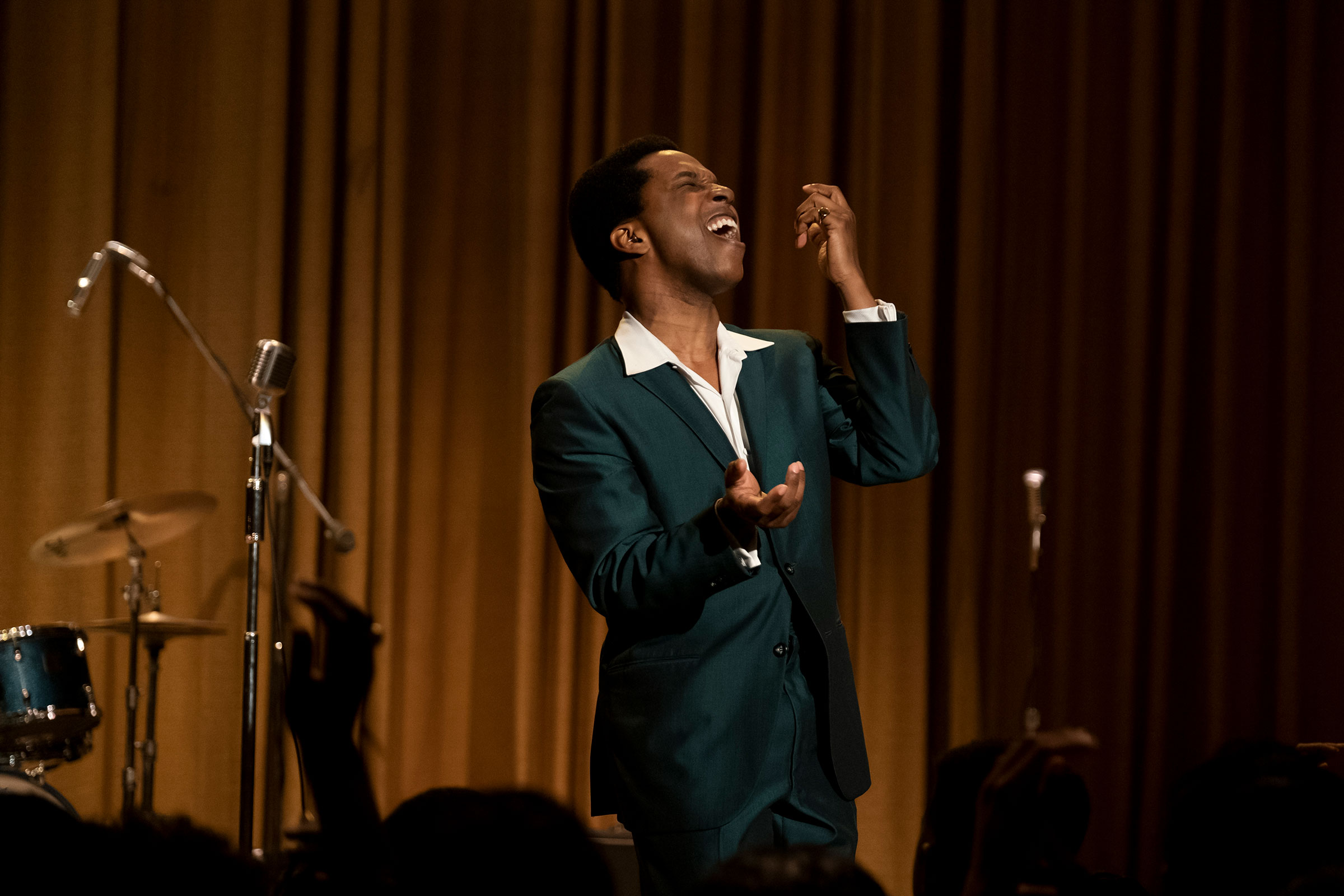
What do famous people talk about behind closed doors? That question is only interesting for about two minutes. But wondering what legends talk about behind closed doors? You can build a whole movie around that, as Regina King does with her directorial debut One Night in Miami, its screenplay adapted by Kemp Powers from his play of the same name.
On February 25, 1964, Malcolm X, Sam Cooke, Jim Brown and Muhammad Ali—at the time still going by the name Cassius Clay—gathered in a hotel room in Miami to celebrate Clay’s audacious victory over Sonny Liston earlier that evening. No one knows exactly what they said to one another on that night, but we do know something about what each of them brought to the table before and after. One Night in Miami imagines what that conversation might have been like, interweaving dramatizations of things these four extraordinary men actually said and did. The result is a blend of fact and fiction that adds depth and texture to our understanding of what America was like during the Civil Rights Movement. It also gives us a better sense of what each of these men, with their distinctive strengths, sought to accomplish, and how their ideas might have clashed even though they were united for a common goal. And in that sense, it speaks to the strife our country is suffering today: Differences of opinion are to be expected. It’s what you do with them that counts.
King opens the movie with thumbnail sketches that give us a sense of these men and the challenges and injustices they’d faced: Brown (Aldis Hodge), already a huge and revered football star, drives out to his hometown in Georgia to visit an old family friend (Beau Bridges), who greets him warmly and, seemingly, with respect—only to end up degrading him with that single ugly word. Clay (Eli Goree) is knocked down early in a fight with British boxer Henry Cooper, at London’s Wembley Stadium, though he ultimately prevails. He knows he’s the greatest, but he can’t yet prove it. Cooke (Leslie Odom Jr.) takes the stage at New York’s Copacabana night club, only to be greeted by the audience’s boredom and, worse, derision. (A few years later he would return, to great acclaim, though the movie doesn’t depict this.) And Malcolm X (Kingsley Ben-Adir), at home with his wife Betty (Joaquina Kalukango), shows his deep anxiety over his increasingly strained relationship with Nation of Islam leader Elijah Muhammad and his desire to leave the organization and start his own offshoot. It’s not an easy break to make.
All of that happens before the four men get together at Miami’s somewhat modest Hampton House Motel, one of the places where Black performers and luminaries were allowed to stay in the deeply segregated city—although Cooke’s manager, Allen Klein, had pulled strings to secure a room for his client at the much tonier Fontainebleau, which becomes a point of contention between Cooke and Malcolm. In the film, the stressed-out Malcolm is presented as something of a scold, lecturing each of his friends on the ways they’re letting the cause down and enabling white oppression: Brown, despite his championing of Black-owned businesses, is hoping to segue into an acting career, a revelation he doesn’t want to make to Malcolm, sensing—rightly—that his friend will disapprove. Clay is on the cusp of converting to Islam, under Malcolm’s tutelage, yet he’s having some doubts about making this leap. But Malcolm reserves most of his virtuous disapproval for Cooke, claiming that the singer has taken sacred church music and turned it into a vehicle for pandering to white people. At one point he plays Bob Dylan’s “Blowin’ in the Wind” as a taunt. Why can’t Cooke write a song as pure and selfless as that? he demands—without knowing that Cooke had already been thinking long and hard about that song.
One Night in Miami gets off to a somewhat uncertain start, and its mix-and-match approach to the historical timeline may be a little confusing at first if you’re not familiar with all of these men and their contributions to their era, and to our own. But the movie, as shot by Tami Reiker, is rich in visual texture. And the actors, all terrific, serve as able guides through the material. Odom’s Cooke, in particular, is astonishing, especially in a scene where he explains to Malcolm a key tenet of Black ownership that the venerated leader has failed to acknowledge. (Cooke knew that the writers of songs, rather than those who merely performed them, held the keys to the moneymaking kingdom.) In the movie’s final sequence, Cooke—as a guest on Johnny Carson’s Tonight Show—performs the song that Dylan’s anthem spurred him to write. Malcolm X would be assassinated roughly a year after the foursome’s meeting at the Hampton House. But the song Cooke gave to the world lives forever, and several generations have continued to reach for it in times of need. When Odom, with his buttery intonation and supple phrasing, performs “A Change Is Gonna Come,” he’s not so much impersonating Cooke as channeling him. And he’s handing the song directly to us, because he knows we need it right now.
Correction, Jan. 26
The original version of this story misstated the winner of the 1963 boxing match between Muhammad Ali (then Cassius Clay) and Henry Cooper at London’s Wembley Stadium. Ali won, not Cooper.
More Must-Reads from TIME
- Cybersecurity Experts Are Sounding the Alarm on DOGE
- Meet the 2025 Women of the Year
- The Harsh Truth About Disability Inclusion
- Why Do More Young Adults Have Cancer?
- Colman Domingo Leads With Radical Love
- How to Get Better at Doing Things Alone
- Michelle Zauner Stares Down the Darkness
Contact us at letters@time.com